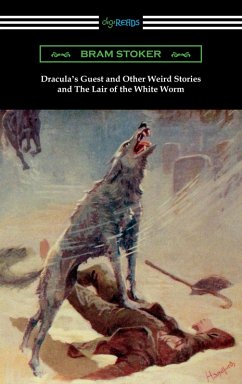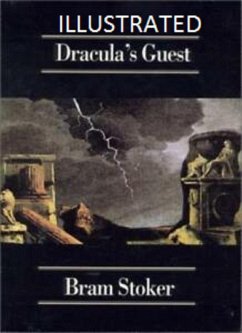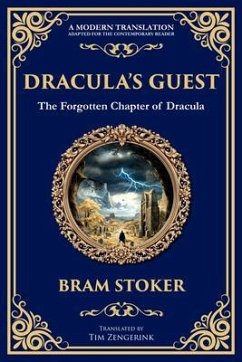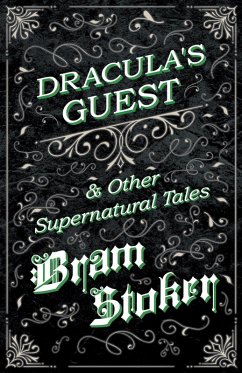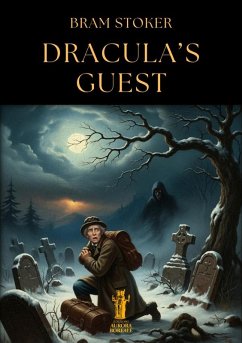
Dracula's Guest - The Original Classic Edition (eBook, ePUB)

PAYBACK Punkte
2 °P sammeln!
Even had Bram Stoker not penned the fabulously successful Dracula, efforts such as the stories in this book would more than qualify him as a gifted, masterful writer, with a special penchant for writing horror. The most prominent story in these pages is of course Draculas Guest, a story excised from the final manuscript of Dracula. This is an interesting, well-told tale, but its exclusion from the aforementioned novel seems to me to be rather inconsequential. The real jewel of this collection is The Judges House. I have read this story several times over the last decade or so, and I must say t...
Even had Bram Stoker not penned the fabulously successful Dracula, efforts such as the stories in this book would more than qualify him as a gifted, masterful writer, with a special penchant for writing horror. The most prominent story in these pages is of course Draculas Guest, a story excised from the final manuscript of Dracula. This is an interesting, well-told tale, but its exclusion from the aforementioned novel seems to me to be rather inconsequential. The real jewel of this collection is The Judges House. I have read this story several times over the last decade or so, and I must say that this is my favorite horror story of all time. It somewhat chagrins me to make such a pronouncement, thinking of the masterful tales of Lovecraft, Poe, and King, yet I am compelled to make it. The ending may be somewhat cliched , but the dark, brooding, smothering atmosphere Stoker creates in this house is powerful and brilliant. The Judges House may well be the most haunted house in literature.
The other seven stories are less noteworthy but eminently readable. Again, there are some cliches to be found among them, but they all work. The Squaw is my least favorite--it is, to some degree, silly in terms of its characters and ending. I should also add that animal lovers such as myself may well be somewhat traumatized by one incident in the story--I certainly was. The Secret of the Growing Gold, The Gypsy Prophecy and The Coming of Abel Behenna are pretty standard fare. The Burial of the Rats presents a thrilling, well-thought-out story of danger and escape (as well as a grim portrait of some of societys underbelly). A Dream of Red Hands is a sort of moralistic story that puts me in mind of some of Hawthornes work. Finally, Crooken Sands is a good doppelganger tale whose presentation and overall air seem different, if not unique, from the other tales in this book. If you love old Scottish dialogue, you will reap some benefits from this story--for the rest of us, though, it makes for some slightly harder reading (but I think the story would be much less effective without it).
All in all, Stoker was a more than capable short story writer, even though he did sometimes stick too closely to the classic form; cliches and predictable plot points do diminish the quality of a few stories but by no means do they seriously hamper the effectiveness of them. It is unfortunate that many people think Stoker wrote Dracula and nothing else. The selections in this book are classic horror stories that only help to grant legitimacy to the genre.
The other seven stories are less noteworthy but eminently readable. Again, there are some cliches to be found among them, but they all work. The Squaw is my least favorite--it is, to some degree, silly in terms of its characters and ending. I should also add that animal lovers such as myself may well be somewhat traumatized by one incident in the story--I certainly was. The Secret of the Growing Gold, The Gypsy Prophecy and The Coming of Abel Behenna are pretty standard fare. The Burial of the Rats presents a thrilling, well-thought-out story of danger and escape (as well as a grim portrait of some of societys underbelly). A Dream of Red Hands is a sort of moralistic story that puts me in mind of some of Hawthornes work. Finally, Crooken Sands is a good doppelganger tale whose presentation and overall air seem different, if not unique, from the other tales in this book. If you love old Scottish dialogue, you will reap some benefits from this story--for the rest of us, though, it makes for some slightly harder reading (but I think the story would be much less effective without it).
All in all, Stoker was a more than capable short story writer, even though he did sometimes stick too closely to the classic form; cliches and predictable plot points do diminish the quality of a few stories but by no means do they seriously hamper the effectiveness of them. It is unfortunate that many people think Stoker wrote Dracula and nothing else. The selections in this book are classic horror stories that only help to grant legitimacy to the genre.
Dieser Download kann aus rechtlichen Gründen nur mit Rechnungsadresse in A, D ausgeliefert werden.





